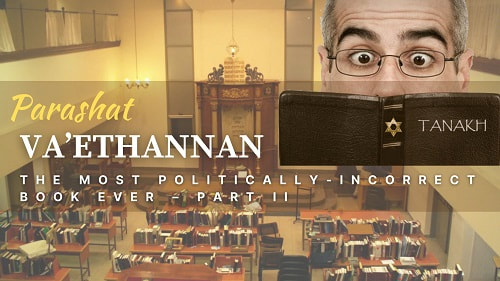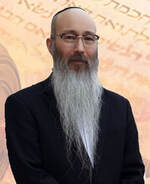|
By: HaRav Menashe Sasson Reporting from Jerusalem, Israel Published in the U.S.A. Tanakh is, at one and the same time, the most popular book in history (more copies of Tanakh have been sold than any other book), as well as the most politically-incorrect book in history. How can this be? The answer, although simple, is not easy for many of us mere mortals to accept. Many people, including, and perhaps especially, Jews who consider themselves to be religiously observant, have difficulty reconciling what Tanakh actually says and what they personally consider to be the “Jewish” or the G-dly” way of doing things. In short, these individuals are trying to make G-d into their image, rather than to accept the Yoke of Heaven and conduct their affairs in accordance with the dictates of Tanakh. These individuals, although tragically in error, at least deserve to be understood; after all, they are in good company. HaShem did not allow Moshe Rabbeinu to enter Eretz Yisra’el, or even to be buried in Eretz Yisra’el, because Moshe considered himself to be an Egyptian-Jew, rather than a Jew whose home was in Eretz Yisra’el, but who just happened to have been born and raised in Egypt. In the opening paragraph of Parasha Va’ethannan, Moshe, talking to Hashem, said “I pray Thee, let me go over and see the good land that is beyond the Yarden. . . .” Debarim 3:25. Hashem responded, “Speak no more to Me of this matter. Go up to the top of the Pisga and lift up thy eyes westward, and northward, and southward, and eastward, and behold with thy eyes, for thou shalt not go over this Yarden.” Id., 26-27. The Midrash explains that HaShem said to Moshe, “Whoever acknowledges his homeland is buried in his homeland, but whoever does not acknowledge his homeland is not buried in his homeland.” Debarim Rabba 2:8. The Midrash further explains that when the daughters of Yitro said “An Egyptian man saved us from the shepherds, Shemot 2:19, “Moshe heard them and remained silent.” Id. But, one might say, acknowledging one’s peoplehood or acknowledging one’s national identity is equivalent to acknowledging one’s homeland. After all, Moshe killed an Egyptian who was attacking a Jew. That incident, among others, proved Moshe’s loyalty to the Jewish people. Surely that should constitute a sufficient acknowledgment by Moshe of his homeland. However, acknowledging one’s people is not the same as acknowledging one’s homeland. Moshe, like many Jews who today live outside of Eretz Yisra’el [חוץ לארץ], might have believed that his country of birth – rather than Eretz Yisra’el – was his homeland. When Yitro’s daughters said that “an Egyptian man saved us,” Moshe remained silent, not because he did not want to identify himself as a Jew, but perhaps because Moshe considered Egypt – not Eretz Yisra’el – to be his homeland. Instead of remaining silent, Moshe, when described as being an “Egyptian,” should have objected by saying, “Although I happen to have been born in Egypt, my homeland, even though I have never been there, is Eretz Yisra’el. The same politically-correct mistake persists in modern times. In 2019, Democrat Muslim U.S. congresswoman Ilhan Omar, in a social media post, implied that some Jews who were born, raised, and live in the United States have “dual-loyalty” to the United States and Israel. Omar’s social media post was widely denounced as “antisemitic.” However, contrary to popular belief, Omar’s social media post was not antisemitic. It was merely a statement which, hopefully, at a minimum, is at least partially true. As we see from the incident involving Moshe Rabbeinu and Yitro’s daughters, Moshe’s sin, like the sin of many Jews who were born in America (and other diaspora countries) is that they believe their country of birth – rather than Eretz Yisra’el – is their home, even if, like Moshe Rabbeinu, they have never been to Eretz Yisra’el. Then there was King Sha’ul, who was commanded by HaShem to kill “Amaleq and utterly destroy all that they have, and spare them not; but slay both man and woman, infant and suckling, ox and sheep, camel and ass.” I Shemu’el 15:3. However, “Sha’ul . . . had pity on Agog,” id., at 15:9, and substituted his “wisdom” for that of HaShem’s by failing to kill Agog, king of Amaleq, as well as some of Amaleq’s choicest animals. King Sha’ul’s attempt at political correctness, that is, not doing as HaShem had commanded and, instead, substituting his value system for the value system of Tanakh, led to Jewish tragedies such as Haman, whom we read about on Purim, as well as Adolf Hitler, who was a spiritual descendant of Agog and Haman. In modern times, we see Medinat Yisra’el (the State of Israel) shunning the requirements of the Torah/Tanakh and, instead, engaging in political correctness by failing to exercise sovereignty over the entirety of Medinat Yisra’el and by attempting to pacify Arabs who currently reside in Israel. If Medinat Yisra’el were to reject political correctness and comply with the requirements of the Torah/Tanakh, it would deny Israeli citizenship to Arabs who live in Medinat Yisra’el and, simultaneously, implement financial incentives which would encourage them to emigrate to the Arab country of their choice. Parashat Va’ethannan also repeats the Ten Commandments [עשרת הדברות], or, more accurately translated, the Ten Statements. Although a comprehensive discussion of how contemporary societies in general, and Medinat Yisra’el in particular, engage in political correctness through a rejection of various Torah commandments is beyond the scope of this article, however, we will briefly discuss one commandment. “You shall not steal [לא תגנב].” Debarim 5:17. This commandment seems fairly straightforward. Simply stated, it means one is forbidden to take property which does not belong to him. The implications of this commandment, however, are many. First, a commandment which forbids stealing property necessarily implies the private ownership of property. Thus, by this simple statement, the Torah forbids political or economic systems which seek to abolish, or even limit or restrict beyond what is needed for the orderly operation of society, the private ownership of property. Next, the Torah does not qualify the prohibition against stealing by limiting it to stealing which is committed by a single individual. Rather, the prohibition applies to both individuals and to groups consisting of more than one individual. Thus, since it is a Torah violation to abolish or needlessly restrict the ownership of private property, as well as a Torah violation for both individuals or groups of individuals to steal, it follows that laws such as taxation which exceeds what is needed for the legitimate functions of government (e.g., military, police, and the like), or laws which impose restraints on trade (import/export taxes, grants of monopoly privilege, employment laws which interfere with the ability of employers and employees to freely bargain for labor services, and central banking systems which allow the money supply to be inflated through fractional-reserve banking) all violate the Torah. Medinat Yisra’el expends significant resources to promote Aliyah, the immigration of diaspora Jews to Israel. However, the Aliyah “coin” has two sides: one side consists of encouraging diaspora Jews to immigrate to Israel. The other side consists of creating a Torah-environment that encourages Jews to remain in Israel. Medinat Yisra’el, a nation-state which was founded by socialists, is a country that is still recovering from socialism. During the years 1978-1979, inflation, caused by government inflation of the money supply, averaged 77 percent. By 1984-1985, inflation peaked at 450 percent! U.S. president Ronald Reagan offered Israel a $1.5 billon grant if Israel would abandon socialism and adopt free-market economic principles. The Histadrut, Israel’s labor union, objected. U.S. Secretary Schultz responded with the threat that if Israel did not start implementing free-market economic policies, the United States would freeze all monetary transfers to Israel. The threat worked and Israel started to implement free-market “recommendations” that were made by the Reagan Administration. The impact on the Israeli economy was immediate and dramatic. Within one year, inflation fell from 450 percent to 20 percent. Although the economy in Medinat Yisra’el is much better now than it was in the 1980s, there is still much work to be done. Each year, significant numbers of Jews who made Aliyah return to their diaspora countries because of economic conditions in Medinat Yisra’el. Additionally, many Israeli-born Jews, many of whom are young men in their 20s, move to diaspora countries where they can better earn a livelihood. Sadly, they sometimes resort to marrying non-Jewish women in order to be able to legally remain in those foreign countries. May we all be blessed to not only learn, but to properly apply, both to our individual and national lives, the lessons from Tanakh, the most politically-incorrect book in history. שבת שלום Shabbat Shalom! Copyright © The Israel Foundation. All Rights Reserved.
0 Comments
Your comment will be posted after it is approved.
Leave a Reply. |
THE ISRAEL FOUNDATION





